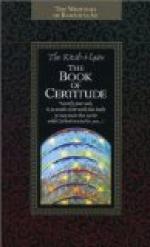And now, consider and reflect a moment upon the waywardness of this people. What could have been the reason for such denial and avoidance on their part? What could have induced them to refuse to put off the garment of denial, and to adorn themselves with the robe of acceptance? Moreover, what could have caused the nonfulfilment of the divine promise which led the seekers to reject that which they had accepted? Meditate profoundly, that the secret of things unseen may be revealed unto you, that you may inhale the sweetness of a spiritual and imperishable fragrance, and that you may acknowledge the truth that from time immemorial even unto eternity the Almighty hath tried, and will continue to try, His servants, so that light may be distinguished from darkness, truth from falsehood, right from wrong, guidance from error, happiness from misery, and roses from thorns. Even as He hath revealed: “Do men think when they say ‘We believe’ they shall be let alone and not be put to proof?"(5)
And after Noah the light of the countenance of Hud shone forth above the horizon of creation. For well-nigh seven hundred years, according to the sayings of men, He exhorted the people to turn their faces and draw nearer unto the Ridvan of the divine presence. What showers of afflictions rained upon Him, until at last His adjurations bore the fruit of increased rebelliousness, and His assiduous endeavours resulted in the wilful blindness of His people. “And their unbelief shall only increase for the unbelievers their own perdition."(6)
And after Him there appeared from the Ridvan of the Eternal, the Invisible, the holy person of Salih, Who again summoned the people to the river of everlasting life. For over a hundred years He admonished them to hold fast unto the commandments of God and eschew that which is forbidden. His admonitions, however, yielded no fruit, and His pleading proved of no avail. Several times He retired and lived in seclusion. All this, although that eternal Beauty was summoning the people to no other than the city of God. Even as it is revealed: “And unto the tribe of Thamud We sent their brother Salih. ‘O my people,’ said He, ’Worship God, ye have none other God beside Him....’ They made reply: ’O Salih, our hopes were fixed on thee until now; forbiddest thou us to worship that which our fathers worshipped? Truly we misdoubt that whereunto thou callest us as suspicious.’"(7) All this proved fruitless, until at last there went up a great cry, and all fell into utter perdition.
Later, the beauty of the countenance of the Friend of God(8) appeared from behind the veil, and another standard of divine guidance was hoisted. He invited the people of the earth to the light of righteousness. The more passionately He exhorted them, the fiercer waxed the envy and waywardness of the people, except those who wholly detached themselves from all save God, and ascended on the wings of certainty to the station which God hath exalted beyond the comprehension of men. It is well known what a host of enemies besieged Him, until at last the fires of envy and rebellion were kindled against Him. And after the episode of the fire came to pass, He, the lamp of God amongst men, was, as recorded in all books and chronicles, expelled from His city.




